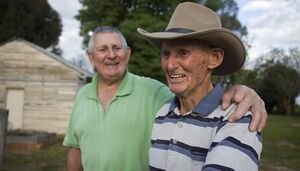White Cunenians: Difference between revisions
Jump to navigation
Jump to search
No edit summary |
No edit summary |
||
| Line 19: | Line 19: | ||
'''White Cunenians''' ({{wpl|Afrikaans}}: ''Blanke Kuneniërs''; {{wpl|Angolan Portuguese|Portuguese}}: ''Cunenheiros Brancos'') are [[Cunenia|Cunenians]] descended from any of the white racial or ethnic groups of Europe and parts of the Middle East. In linguistic, cultural and historical terms, they are generally divided between the {{wpl|Afrikaans}}-speaking descendants of the {{wpl|Dorsland Trek|Dorsland trekkers}}, who form the majority, and a minority of {{wpl|Portuguese diaspora#Africa|Lusophone descendants}} of predominantly {{wpl|Portuguese people|Portuguese colonists}}. In 2014, an estimated 89.9% were native speakers of Afrikaans, 9.2% were native speakers of Portuguese, and just under 1% spoke another language as their mother tongue — particularly {{wpl|German Namibians|German}} along the {{wpl|Namibia|Namibian}} border. Overall, White Cunenians make up about 7.12% of the total Cunenian population. | '''White Cunenians''' ({{wpl|Afrikaans}}: ''Blanke Kuneniërs''; {{wpl|Angolan Portuguese|Portuguese}}: ''Cunenheiros Brancos'') are [[Cunenia|Cunenians]] descended from any of the white racial or ethnic groups of Europe and parts of the Middle East. In linguistic, cultural and historical terms, they are generally divided between the {{wpl|Afrikaans}}-speaking descendants of the {{wpl|Dorsland Trek|Dorsland trekkers}}, who form the majority, and a minority of {{wpl|Portuguese diaspora#Africa|Lusophone descendants}} of predominantly {{wpl|Portuguese people|Portuguese colonists}}. In 2014, an estimated 89.9% were native speakers of Afrikaans, 9.2% were native speakers of Portuguese, and just under 1% spoke another language as their mother tongue — particularly {{wpl|German Namibians|German}} along the {{wpl|Namibia|Namibian}} border. Overall, White Cunenians make up about 7.12% of the total Cunenian population. | ||
==History== | |||
==Culture== | |||
==Issues== | |||
[[category:Ethnic groups of Cunenia]] | [[category:Ethnic groups of Cunenia]] | ||
Latest revision as of 19:06, 21 June 2019
 Elderly farmers from Huila Province | |
| Total population | |
|---|---|
| 2014 estimate: 306,300 | |
| Regions with significant populations | |
| Central and Western Cunenia | |
| Huila Province | 214,396 (9.10% provincial population) |
| Kunene Province | 67,380 (6.98% provincial population) |
| Namibe Province | 21,440 (4.55% provincial population) |
| Okavango Province | ~3,200 (0.63% provincial population) |
| Languages | |
| Afrikaans (89.9%), Portuguese (9.2%), other (0.9%) | |
| Religion | |
| Christianity (85.6%), Irreligious (12.9%), Judaism (0.9%), other (0.6%) | |
| Related ethnic groups | |
| White South Africans, White Namibians, White Zimbabweans, White Angolans | |
White Cunenians (Afrikaans: Blanke Kuneniërs; Portuguese: Cunenheiros Brancos) are Cunenians descended from any of the white racial or ethnic groups of Europe and parts of the Middle East. In linguistic, cultural and historical terms, they are generally divided between the Afrikaans-speaking descendants of the Dorsland trekkers, who form the majority, and a minority of Lusophone descendants of predominantly Portuguese colonists. In 2014, an estimated 89.9% were native speakers of Afrikaans, 9.2% were native speakers of Portuguese, and just under 1% spoke another language as their mother tongue — particularly German along the Namibian border. Overall, White Cunenians make up about 7.12% of the total Cunenian population.